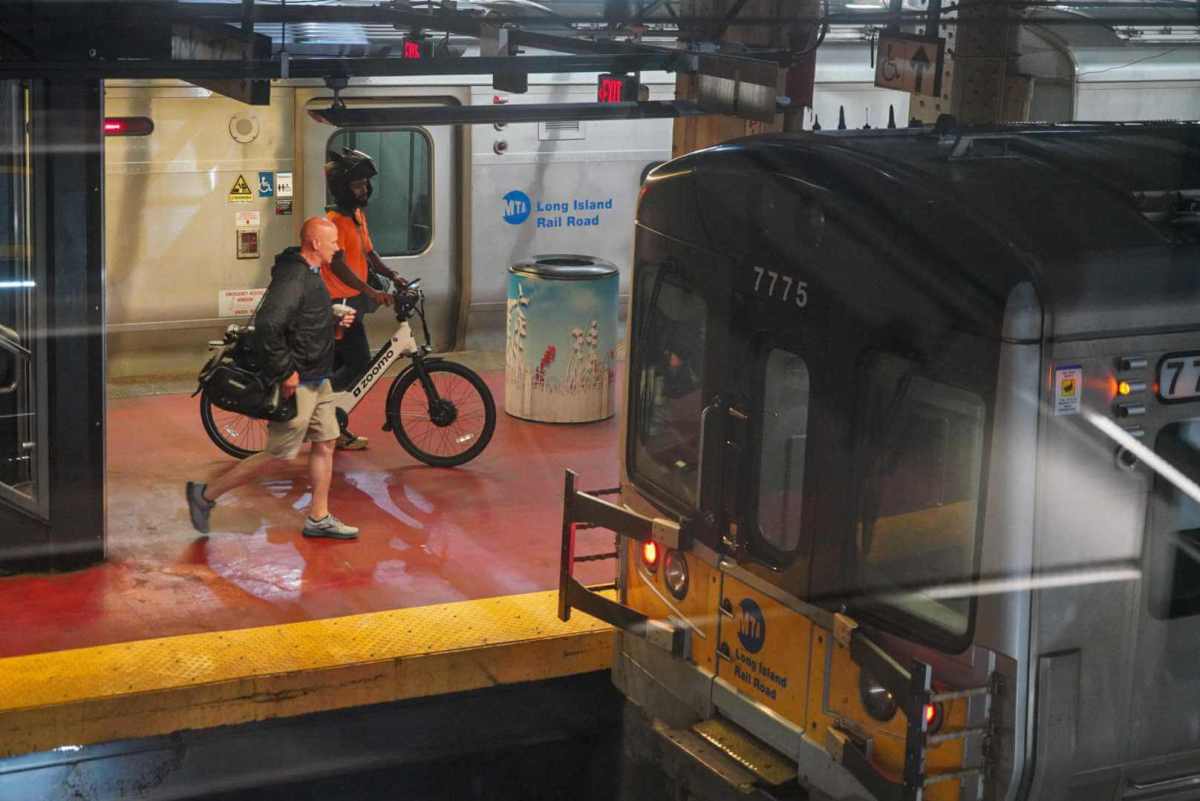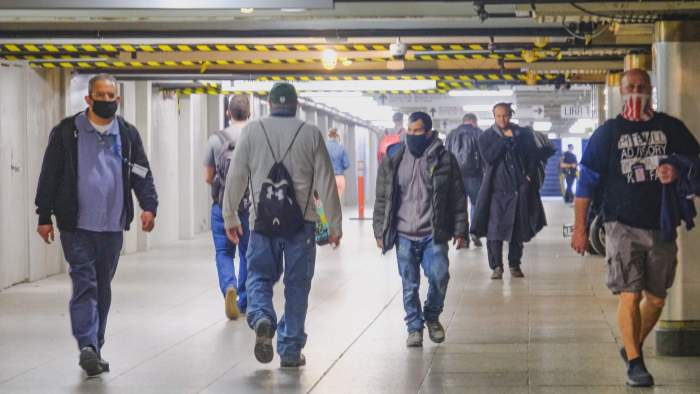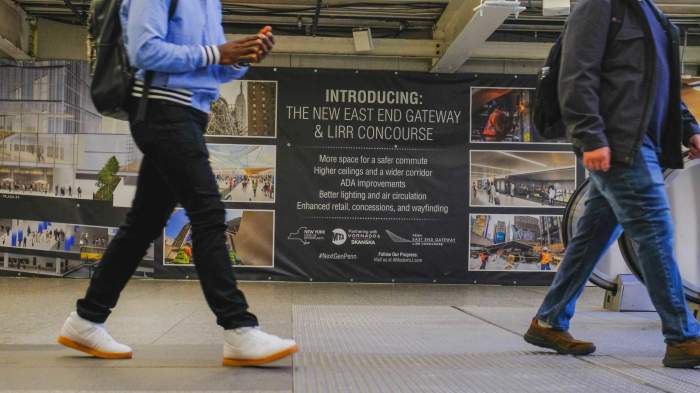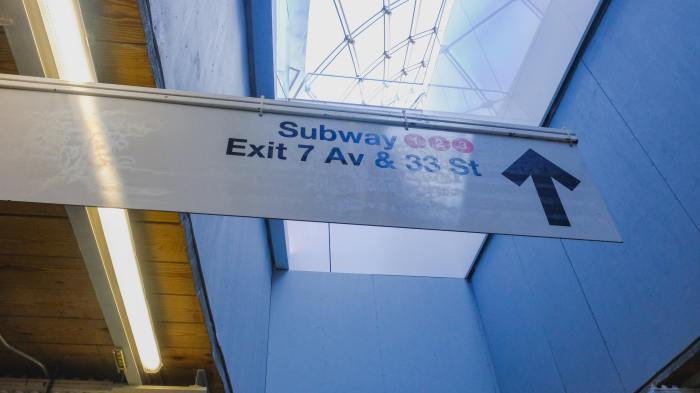Governor Kathy Hochul and Mayor Eric Adams announced on Monday that they agreed to a “financial framework” for the controversial Penn Station redevelopment plan.
Under the deal, the developers of a new 10-tower predominantly-office campus around the station will not have to pay city property taxes, but instead send proceeds to fund a makeover of the dark and cavernous transit hub.
“The current Penn Station is unsightly, inefficient, and impossible to navigate, and New York commuters deserve better,” Hochul said in a statement on July 18. “This agreement brings us one step closer to a beautiful, modern station worthy of New York with vibrant open space, lively streetscapes, and better, more seamless connections to local transit.”
The agreement came after good government groups and lawmakers warned for months that Hochul’s plans lacked key details about its funding and could deliver huge tax breaks to one of her donors, while leaving New Yorkers on the hook to shell out billions of dollars for the project.
The proposal will bring more than 18 million square feet of new development across eight sites in the area around Penn Station — roughly the size of Hudson Yards.

Proceeds from those new buildings will pay for up to half of the $6-8 billion renovations of Penn Station, which will beautify the space but not add any more train capacity.
Hochul wants to use an elaborate scheme where the developments are exempt from city property taxes, but have to make so-called payments in lieu of taxes, or PILOTs, to pay back part of the state bonds to fund that project.
Those payments could also fully fund revamps of the streetscape around Penn Station and provide a small fraction of the money to build more tracks to the south of the station in the future.
“Today’s agreement is a win-win for New Yorkers — helping to deliver improved transit access, affordable housing, and quality jobs while also safeguarding future revenue and protecting against financial risk,” said Adams in a statement.
PILOT project
According to the agreement, the PILOTs will pay for up to 12.5% of what the letter dubs “penn reconstruction.”
That includes a wholesale makeover of the station by moving passengers to the lower level and taking out parts of the upper floor to create a more open and bright space with a new central concourse and a “soaring, glass-enclosed and light-filled” train hall.
The payments can also fund up to 50% of “transit improvements,” consisting of renovations to the platforms and tracks in the station, and the addition of more walkways, stairs, escalators, and elevators to the local subway stations.
The proceeds could pick up as much as 100% of the cost for so-called “public realm improvements” around the station, including redesigns of the street, sidewalks, and other public space around the station, which will cost around $2 billion, according to the latest estimates.
A future “potential” expansion of Penn Station to the south with more tracks may get 12.5% of its funding from the PILOTs, according to the letter. The MTA estimates the total cost of that project at $13 billion.
That expansion will be required to accommodate increased train traffic as part of the so-called Gateway project to add two single-track tunnels under the Hudson River, which is still stuck in discussions between New York, New Jersey, and Washington, D.C..
The real estate companies won’t have to pay property taxes on the sites until they finish making the agreed PILOTs, or for up to 80 years, under the agreement.
Part of the payments will refund lost city property taxes at current rates with a 3% increase each year.

The deal was hailed by the head of the New York Building Congress, an industry trade group.
“With this agreement, we’re one step closer to delivering a plan that will boost the entire region’s economy, support our communities, create tens of thousands of new jobs and transform Penn Station and the surrounding district into the modern, vibrant commuter hub it was always destined to be,” said the organization’s CEO and President Carlo Scissura in a statement.
Watchdog sounds alarm
Hochul’s proposal, which she inherited from former Governor Andrew Cuomo, has raised concerns among government transparency organizations and politicians since she revived the plans in November.
An expert report released last week and commissioned by watchdog group Reinvent Albany estimated that the plan could give developers up to $1.2 billion in tax breaks.
The giveaway would hugely benefit companies like Vornado Realty Trust, which owns or leases the largest share of the Penn Station development site and whose CEO, Steven Roth, is a major political donor of Hochul’s.
Reinvent Albany’s Executive Director John Kaehny slammed the Monday announcement for not giving dollar amounts for how much money the state expects to raise from the PILOTs and lose in city tax revenues.
“This framework agreement is embarrassing,” Kaehny said in an interview. “It answers zero of the important questions of why should this project be funded through PILOTs versus conventional financing.”
“We’re in ‘The Emperor’s New Clothes’ territory,” he added.
The letter signed by city and state reps is also not legally binding, and officials will still have to craft a more formal agreement.
Even though the state promises to refund city tax losses at present rates with an annual increase, property values will skyrocket under the deal and outpace those refunds, depriving the Big Apple of revenue for services like schools, parks, police, fire, and sanitation for decades, Kaehny estimated.
“What you’re talking about is city taxpayers missing out on the potential upsides of this humongous development in the heart of Midtown,” he said.
The payments the developers will make go straight toward their own backyard, by improving the street scape and the train station, boosting their property values rather than fill the city’s general tax coffers, Kaehny noted.
“These PILOTs are going to go directly to benefiting the value these developers have been sitting on,” he said. “This is the sweetheart deal of the century for Vornado.”
The state authority in charge of the land use changes, Empire State Development, will hold a vote on the proposal Thursday morning, July 21, for which the authority published a nearly 1,000-page document of materials.
The scheme will also need a unanimous support from an obscure state panel known as the Public Authorities Control Board (PACB), made up of representatives from the governor and the state legislature, which oversees development projects by public authorities.
Hochul has punted on a state bill that would give lawmakers more independence if they want to veto the plans, but they could still do so if they raise issues with its financing, according to Kaehny.
Update (Tuesday, July 19, 11:30 a.m.): This story has been edited to clarify the breakdown of PILOT contributions laid out in the agreement letter. The changes to the piece also include more information about the project cost estimates from ESD’s board meeting materials.







































